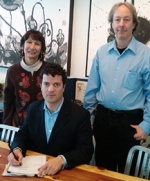
7 San Francisco Bay Municipalities Agree to Protect Bay from Sewage
During the last rainy season, almost 125 million gallons of sewage overflowed into San Francisco Bay from the East Bay Municipal Utility District's wet weather facilities.
The U.S. Environmental Protection Agency, Justice Department, California Water Boards, and San Francisco Baykeeper on March 15 lodged a stipulated order that will settle a Clean Water Act enforcement action against seven municipalities in the East Bay Municipal Utility District (EBMUD).
During the most recent rainy season, which began in October 2010, nearly 125 million gallons of untreated or partially treated sewage from EBMUD’s wet weather facilities overflowed into the San Francisco Bay.
The seven municipalities listed as defendants in the order have cooperatively agreed to update aging infrastructure and collection systems that have been major contributors to the overflows.
Raw sewage contains pathogens that threaten public health, leading to beach closures and public advisories against fishing and swimming. This problem particularly affects older urban areas, where minority and low-income communities are often concentrated. Keeping raw sewage and contaminated stormwater out of the waters of the United States is one of EPA’s National Enforcement Initiatives for 2011 to 2013.
The settlement is the latest one that will reduce the discharge of raw sewage and contaminated stormwater into United States’ bays, rivers, streams, and lakes. Other U.S. cities that have made similar improvements following a federal order include: Los Angeles, San Diego, Honolulu, Cincinnati, Washington D.C., and more than 40 more. The initiative will focus on reducing discharges from sewer overflows by obtaining cities’ commitments to implement timely, affordable solutions to these problems, including the increased use of green infrastructure and other innovative approaches.
As part of the order, Oakland, Emeryville, Piedmont, Berkeley, Alameda, Albany, and the Stege Sanitary District (which serves Kensington, El Cerrito, and the Richmond Annex section of Richmond) will make substantial improvements to their wastewater collection systems to reduce sewage spills to the Bay. These defendants are collectively referred to as ‘satellite communities’ in the stipulated order.
After filing an initial administrative order, EPA referred this action to the Justice Department in December 2009. Following this referral, the United States filed suit against the satellite communities. The San Francisco Bay Regional Water Quality Control Board and the State Water Resources Control Board are also participating in the litigation and the settlement.
As part of the settlement, the San Francisco Bay Regional Water Quality Control Board will help to oversee the satellite communities’ compliance with the stipulated order. "This settlement is a significant step in ensuring coordinated and proper investments by the East Bay communities in their sewer infrastructure,” said Bruce Wolfe, executive officer of the San Francisco Bay Regional Water Quality Control Board. “This will result in healthier creeks and a cleaner Bay."
San Francisco Baykeeper intervened as a plaintiff in this action, and is a party to this stipulated order. "The plans we have agreed to here will set in motion significant projects that will create green jobs and result in a cleaner Bay,” said Jason Flanders of San Francisco Baykeeper. “We look forward to working with EPA and the Water boards to ensure that these infrastructure improvements occur expeditiously."
The Justice Department, California Water Boards, Baykeeper, and the satellite communities collaborated in settlement negotiations aimed at developing initial measures that would complement the work required by a 2009 EBMUD stipulated order.
Source: U.S. Environmental Protection Agency